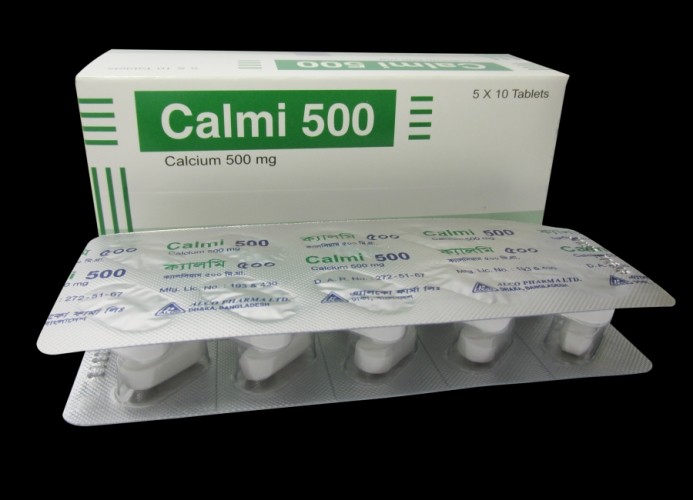ঔষধের বিস্তারিত বা বিকল্প ঔষধ জানতে ঔষধের নাম দিয়ে সার্চ দিন। যেমন- Napa বা Alatrol বা Amodis
Calmi 500mg
TabletCalcium Carbonate
Alco Pharma
Other Strength:
- Calmi-D 500mg+200IU
- Calmi-M
Alternative:
- Aristocal 500mg
- A-CAL 500mg
- Calbo 500mg
- Rocal 500mg
- Calcium A 500mg
- Acical 500mg
- Calbon 500mg
- Carben 500mg
- Calcin 500mg

Calmi
Description:
Calcium is an essential element and plays vital roles in the body. It helps body's framework stronger by building bone. Clinical evidence suggests that calcium is useful for prevention and treatment of osteoporosis and associated fractures.
Composition:
Calmi-500 Tablet: Each film coated tablet contains Calcium Carbonate USP
1250 mg equivalent to elemental Calcium 500 mg.
Indication/Use:
Raised Calcium requirement, e.g. during pregnancy and lactation and in children & adolescents at the time of rapid growth.
Inadequate intake of Calcium in the diet due to malnutrition.
Prevention and treatment of osteoporosis.
Disorders of osteogenesis and tooth formation.
Dosage Guideline:
Adult: One tablet (500 mg elemental Calcium) daily or as directed by the physician. Higher doses should not be taken unless recommended by the physician.
Children: 250 mg elemental Calcium daily or as directed by the physician.
Adolescents: 250-500 mg elemental Calcium daily or as directed by the physician.
Side Effects:
In rare cases flatulence, diarrhoea or constipation.
Contraindication:
Hypersensitivity to the Calcium Carbonate or any inactive ingredient of the medication. Hypercalcemia (e.g. in hyperparathyroidism, overdosage of vitamin D, demineralizing tumours such as plasmacytomas and bone metastases), severe hypercalcuria, several renal insufficiency.
Drug Interaction:
Oral Calcium can reduce the absorption of tetracycline and fluoride preparations and in interval of at least 3 hours should therefore be allowed between ingestion of these medications. Vitamin D increases enteral absorption of Calcium. The intestinal uptake of calcium from Calmi-500 tablets may be reduced by concomitant ingestion of certain foods (e.g. spinach, rhubarb, bran and other cereal products, milk and milk products). At high doses and in combination with vitamin D, Calcium may decrease the response to Verapamil and possibly to other Calcium antagonists. In digitalized patients, high doses of Calcium may increase the risk of cardiac arrhythmias.
Use in Pregnancy & Lactation:
Pregnant women: Calcium containing drugs are used widely in pregnancy by way of calcium supplement or antacid therapy. No relationship between malformation in general and calcium exposure has been noted.
Lactating mother: There is no contraindication to the use of calcium carbonate in lactating mother.
Over Dose:
The symptoms of a single, acute overdose from accidentally or intentionally taking too many calcium supplements or calcium-containing antacids at one time include stomachache, constipation or diarrhea, headache, nausea and vomiting. An overdose can ultimately lead to mental confusion, irregular heartbeat, high blood pressure and coma.
Precaution:
In the presence of mild hypercalciuria, excretion levels must be carefully monitored and where necessary the dose of calcium carbonate should be reduced or treatment should be stopped. Patients with a history of stone formation should also be recommended to increase their fluid intake. High dosage of vitamin D should be avoided during Calcium therapy unless specifically indicated.
Therapeutic Class:
Vitamin & Minerals
Dosage Form:
Tablet
Storage:
Store in a cool and dry place, protected from light.
এই পাতাটি ২২৪ বার দেখা হয়েছে
রাজডক কী?
ফ্রী সদস্য হোন Click Here
ডাক্তার হিসাবে যোগদান করতে Click Here
নার্স / টেকনোলজিস্ট হিসাবে যোগদান করতে Click Here
ফ্রী সদস্য হোন Click Here
ডাক্তার হিসাবে যোগদান করতে Click Here
নার্স / টেকনোলজিস্ট হিসাবে যোগদান করতে Click Here

